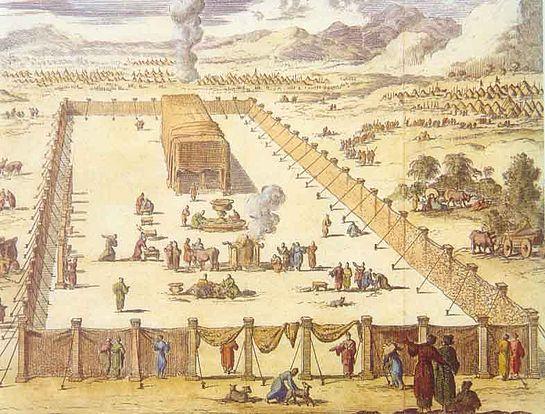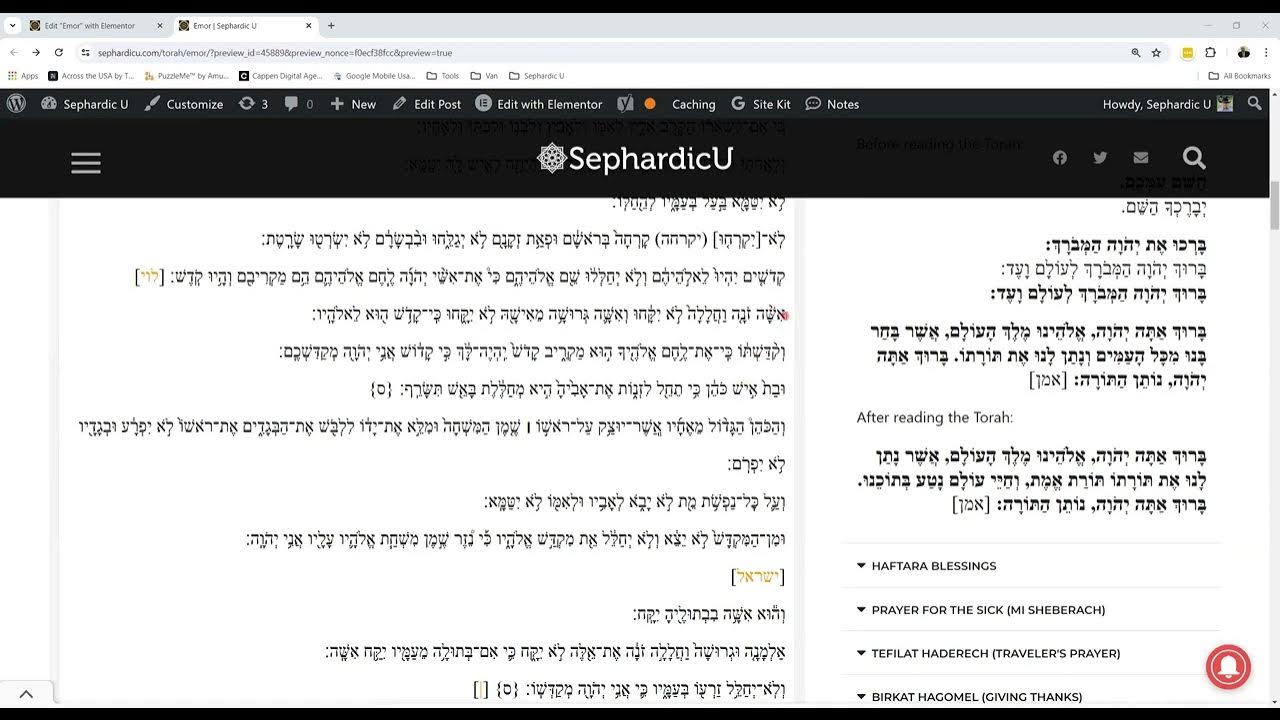Levítico 6, vs 1-4:
Aquí Moisés instruye al sumo sacerdote Aarón y a sus hijos, acerca de algunas leyes sobre el sacrificio y sus procedimientos.
Levítico 6, vs 6:
אֵ֗שׁ תָּמִ֛יד תּוּקַ֥ד עַל־הַמִּזְבֵּ֖חַ לֹ֥א תִכְבֶּֽה
o “…fuego perpetuo arderá sobre el altar; no se apagará…”: El altar debía de mantenerse siempre encendido para las ofrendas de fuego a Dios.
Levítico 6, vs 9:
וְהַנּוֹתֶ֣רֶת מִמֶּ֔נָּה יֹאכְל֖וּ אַהֲרֹ֣ן וּבָנָ֑יו
o “…y el remanente de ella lo comerán Aarón y sus hijos…”: Esta es la parte de la ofrenda que les correspondía comer porque los sacerdotes Levitas no tenían medios propios para sobrevivir que de una porción de las ofrendas del pueblo de Israel a Dios.
Levítico 6, vs 10:
לֹ֤א תֵאָפֶה֙ חָמֵ֔ץ חֶלְקָ֛ם נָתַ֥תִּי אֹתָ֖הּ מֵאִשָּׁ֑י קֹ֤דֶשׁ קׇֽדָשִׁים֙ הִ֔וא
o “…no será cocido con levadura; su parte se la di de mis holocaustos; santo santísimo es…”: El hecho de que ya había sido ofrecido a Dios como presente no les permitía cocinarlo con levadura antes de comerlo porque debían de comerlo en el Tabernáculo de Reunión.
Levítico 6, vs 11:
כׇּל־זָכָ֞ר בִּבְנֵ֤י אַהֲרֹן֙ יֹֽאכְלֶ֔נָּה
o “…todo varón de los hijos de Aarón lo comerán…”: Las hembras no estaban permitidas a comer de ello.
Levítico 6, vs 11:
כֹּ֛ל אֲשֶׁר־יִגַּ֥ע בָּהֶ֖ם יִקְדָּֽשׁ
o “…todo el que los toque será santificado…”: Por haber sido ofrecido a Dios primero, estaba santificado y solamente los hijos varones de Aarón, tenían el privilegio de comerlo porque ellos estaban al servicio de Dios.
Levítico 6, vs 12-16:
Aquí se menciona la ofrenda que Aarón y sus hijos debían de ofrecer en el día de su consagración.
Levítico 6, vs 18-23:
Aquí se menciona la ofrenda por el pecado con su procedimiento.
Levítico 7, vs 1-10:
Aquí se menciona la ofrenda por el sentido de culpabilidad con su procedimiento.
Levítico 7, vs 11-15:
Aquí se menciona la ofrenda por la comunión o acción de gracias con Dios con el procedimiento de rigor.
Levítico 7, vs 16-18:
Aquí se menciona la ofrenda por haber hecho voto a Dios, con el procedimiento de rigor.
Levítico 7, vs 21:
וְאָכַ֛ל מִבְּשַׂר־זֶ֥בַח הַשְּׁלָמִ֖ים אֲשֶׁ֣ר לַיהֹוָ֑ה וְנִכְרְתָ֛ה הַנֶּ֥פֶשׁ הַהִ֖וא מֵעַמֶּֽיהָ
O “…y (todo el que) comiere de la carne del sacrificio de comunión con Dios y será cortada ese alma de entre su pueblo…”: Ningún extraño o no Levita podía comer de ello. El pecado luce bien severo porque, aparentemente, perdía la provisión de la vida eterna al no pertenecer al pacto de Dios con el pueblo de Israel.
Levítico 7, vs 23:
כׇּל־חֵ֜לֶב שׁ֥וֹר וְכֶ֛שֶׂב וָעֵ֖ז לֹ֥א תֹאכֵֽלוּ
o “…todo cebo de buey, de cordero o de cabra no comeréis…”: El cebo es de color amarillento y es mucho más denso que la grasa; no se ha de comer aunque se puede usar para otras cosas.
Levítico 7, vs 27:
כׇּל־נֶ֖פֶשׁ אֲשֶׁר־תֹּאכַ֣ל כׇּל־דָּ֑ם וְנִכְרְתָ֛ה הַנֶּ֥פֶשׁ הַהִ֖וא מֵֽעַמֶּֽיהָ
o “…toda alma que comiere cualquier tipo de sangre y será cortada ella de su pueblo…”: El alma que comiere sangre sería desprovista de la provisión de vida eterna, al ser cortado de su pueblo santo.
Levítico 8, vs 1-11:
Aquí se menciona el procedimiento para la consagración de los sacerdotes.
Levítico 8, vs 12:
וַיִּצֹק֙ מִשֶּׁ֣מֶן הַמִּשְׁחָ֔ה עַ֖ל רֹ֣אשׁ אַהֲרֹ֑ן וַיִּמְשַׁ֥ח אֹת֖וֹ לְקַדְּשֽׁוֹ
o “…y derramó el aceite de la unción sobre la cabeza de Aarón y lo ungió santificándolo…”: El aceite de la unción sobre su cabeza era el ritual de rigor para consagrarlo como sumo sacerdote. El aceite debía de ser de aceituna de oliva machacada. Las propiedades del aceite hacen que este no se pueda mezclar con liquido alguno y además, por ser más ligero, sube a la superficie, lo cual lo hace estar siempre arriba, un principio espiritual de ser cabeza en vez de cola. El sumo sacerdote no era el único que llevaba la unción como משיח. Los reyes también la llevaban. Lo que no existe en la Biblia es el concepto de ningún משיח o Mesías (ungido) salvador de almas. Sólo יהוה Dios está facultado para salvar almas y nadie más.
Levítico 8, vs 35:
וּפֶ֩תַח֩ אֹ֨הֶל מוֹעֵ֜ד תֵּשְׁב֨וּ יוֹמָ֤ם וָלַ֙יְלָה֙ שִׁבְעַ֣ת יָמִ֔ים
o “…y a la puerta del Tabernáculo de Reunión estaréis de día y de noche durante siete días…”: En esos siete días no les estaba permitido al sumo sacerdote Aarón y a sus hijos a abandonar ese lugar. Era un ciclo sagrado que se debía de cumplir en recordación de la obra de la creación universal.








Parashat Behar – Weekday Torah Reading (Moroccan TeAmim)